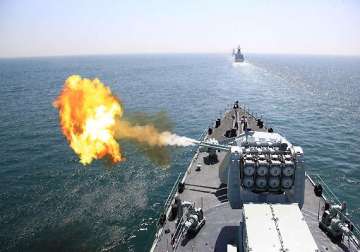Beijing, Sep 18: The US today invited China to take part in the world's biggest maritime drills, amid growing concerns here over Washington's new policy of deploying majority of its defence assets in Asia Pacific aimed at containing Beijing.
US Secretary of Defence Leon Panetta who held talks with Chinese Defence Minister Liang Guanglie here today invited China to participate in the 2014 Rim of the Pacific Exercise (RIMPAC).
The biannual exercise, hosted by the commander of the US Pacific Fleet, is the world's largest maritime exercise. Navies of 22 countries took part in it this year, while China has been omitted out of it, which Chinese defence officials said was deliberately aimed at slighting Beijing.
“The US Navy will invite China to send a ship to participate in the RIMPAC 2014 exercise,” Panetta said.
“We note that the US and China just this week participated in a very successful counter-piracy exercise in the Gulf of Aden. These exercises enhance the ability of our navies to work together to ‘combat' the common threat of piracy,” Panetta told a joint press conference with Liang after their talks.
Panetta said US goal “is to have the United States and China establish the most important bilateral relationship in the world. And the key to that is to establish a strong military-to-military relationship.”
“We also discussed establishing peacekeeping exchanges between our two militaries to enhance our capabilities in this critical area,” he said.
The US hopes to learn from China's experiences in leading UN peacekeeping missions in Cyprus and Western Sahara, he said.
The US-China relationship requires long-term perspective. The progress will not only benefit China and the US, but will also contribute to peace and prosperity in the Asia-Pacific region, he said.
Latest World News
